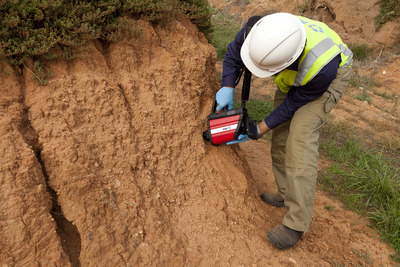Portable device detects soil contamination
Tuesday, 14 August, 2012
Ziltek and CSIRO have announced the commercialisation of a handheld device for the rapid in-field analysis of petroleum contamination in soil.
The RemScan device uses an infrared signal to directly measure petroleum hydrocarbons in soil. The user simply pulls the trigger for a result in 15 seconds. The traditional method for measuring petroleum contamination involves sending soil samples to a laboratory and waiting several days for the results.
Petroleum contamination is a widespread global issue with recent events like the Gulf of Mexico spill attracting attention from communities concerned about the health and environmental impacts of such spills.
The device allows users to make quicker and smarter clean-up decisions leading to significant cost savings. It also decreases the number of samples that require laboratory analysis, resulting in further cost reductions.

“We now have a way to quickly assess the risks at a spill site,” said Ziltek Managing Director Dr Richard Stewart.
A South Australian-based waste remediation company, Ziltek has had significant demand from the mining sector where petroleum spills are costly because they divert resources away from the core business. RemScan allows the emergency response team to quickly delineate the spill and validate the clean-up area with increased certainty - all in the same day.
“An average mid-size remediation firm in Australia will spend around $250,000 on soil petroleum analysis each year,” said Dr Stewart. “RemScan can cut this bill by up to 50%, resulting in an annual cost saving of up to $125,000 per annum.”
According to Dr Mike McLaughlin, Science Fellow with CSIRO Land and Water, it’s a great example of how CSIRO can work with small business to develop a product that will have real benefits for the community.
The technology is the subject of several global patent applications and has been granted full patent status in Australia. The development of the RemScan was supported through the HazWaste Fund (EPA Victoria), Bio Innovation SA and the Australian Government’s Enterprise Connect - Researchers in Business grant.
The research was supported by CSIRO Land and Water and the Water for a Healthy Country Flagship.
How Australia can increase its circularity rate
An expert said the solution could lie in developing onshore processing plants and creating...
Scouts SA secures future of its recycling centres
Scouts SA has partnered with Container Deposit Scheme specialist Return-It to grow its Scout...
Mining waste provides strong boost to concrete construction
Flinders University researchers are turning mining waste into a tool for sustainable...







